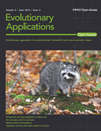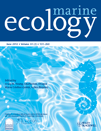
Evolutionary Applications
Scope & Guideline
Exploring the Intersection of Evolution and Innovation
Introduction
Aims and Scopes
- Evolutionary Genetics:
Research in this area explores genetic variations and adaptations within populations, often using genomic data to inform conservation strategies and understand evolutionary processes. - Conservation Genomics:
This scope involves using genomic tools to assess genetic diversity, population structure, and adaptive potential in threatened species, guiding conservation efforts. - Ecological Genomics:
The journal highlights studies that connect ecological factors with genomic responses, providing insights into how species adapt to changing environments. - Applied Evolutionary Biology:
This area includes research on the application of evolutionary principles in agriculture, pest management, and public health, focusing on practical solutions to biological problems. - Invasive Species Dynamics:
Papers often discuss the evolution and management of invasive species, examining their impact on native ecosystems and the evolutionary responses of both invaders and native species. - Climate Change Adaptation:
The journal addresses how species adapt to climate change, including studies on genetic resilience and the role of evolutionary processes in facilitating adaptation.
Trending and Emerging
- Genomic Applications in Conservation:
There is an increasing focus on using genomic tools to inform conservation strategies, including studies on genetic rescue, adaptive management, and the genetic basis of resilience in populations. - Urban Evolution:
Research on how urbanization impacts evolutionary processes is gaining traction, with studies examining the adaptive responses of species to urban environments and the implications for biodiversity. - Epigenetics and Evolution:
The exploration of epigenetic mechanisms and their roles in evolution and adaptation is becoming more prominent, reflecting a broader understanding of genetic influence beyond traditional DNA sequences. - Microbiome Interactions:
Emerging studies are investigating the role of microbiomes in evolution, particularly in how they influence host adaptations and responses to environmental changes. - Climate Change Resilience:
Research focusing on the evolutionary implications of climate change is becoming increasingly relevant, with studies highlighting the adaptive potential of species in response to shifting environmental conditions.
Declining or Waning
- Traditional Population Genetics:
Research focused solely on classical population genetic methods has seen a decrease, as more integrative approaches that combine genomics with ecological and evolutionary theory gain prominence. - Laboratory-Based Studies:
There is a waning interest in laboratory-based evolutionary studies that do not incorporate field applications or real-world relevance, as the field increasingly emphasizes applied research. - Single-Species Focus:
Papers concentrating on single species without considering broader ecological or evolutionary contexts are becoming less common, reflecting a shift towards more holistic and integrative studies.
Similar Journals

GENETICA
Connecting Genetics to the Biological WorldGENETICA is a prominent journal published by SPRINGER, dedicated to advancing the field of genetics and its applications across various biological disciplines, including animal science, plant science, and insect science. Since its inception in 1919, the journal has consistently served as a vital platform for researchers and professionals to disseminate high-quality research findings that explore the genetic bases of biological phenomena. With its current scope spanning from 1943 to 2024, GENETICA holds a commendable position in the academic community, as evidenced by its Q2 ranking in both animal science and insect science, and its active contribution to interdisciplinary studies in genetics. Although the journal does not offer open access, it remains accessible through institutional subscriptions and libraries, ensuring its vital research is widely circulated. Researchers, professionals, and students alike will find GENETICA an invaluable resource for the latest discoveries and methodologies in the ever-evolving landscape of genetics.

AoB Plants
Innovating research for a greener tomorrow.AoB Plants is a distinguished open-access journal published by Oxford University Press, dedicated to advancing the field of plant science. Since its inception in 2009, this journal has played a pivotal role in disseminating high-quality research that encompasses a wide range of topics including plant biology, ecology, and biotechnology. With an impressive impact factor and a ranking in the Q1 quartile for Plant Science, AoB Plants is recognized for its innovative contributions and scholarly rigor, ranking #129 out of 516 in the Scopus Agricultural and Biological Sciences category, placing it in the 75th percentile among its peers. By promoting open-access availability of research findings, the journal empowers researchers and practitioners alike, facilitating greater collaboration and knowledge sharing in the global scientific community. Situated in the heart of the United Kingdom, AoB Plants continues its commitment to providing a platform for pioneering research and developments in plant science, thus fostering a deeper understanding of the crucial roles that plants play in our ecosystems and economies.

Conservation Genetics Resources
Advancing the Frontiers of Genetic ConservationConservation Genetics Resources, published by SPRINGER in Germany, is a key resource in the field of conservation science, focusing on the genetic aspects essential for biodiversity preservation and ecosystem management. With an ISSN of 1877-7252 and an E-ISSN of 1877-7260, this journal has established its presence as a vital platform for disseminating high-quality research that addresses the challenges of genetic conservation strategies. Notably, it has demonstrated a strong academic impact, currently holding a Q3 ranking in Ecology, Evolution, Behavior and Systematics and Q4 in Genetics for 2023, alongside Scopus ranks that position it as a notable contributor in its fields. This journal invites contributions that enhance the understanding of genetic diversity, population genetics, and conservation genomics, and it serves as an essential reference for researchers, professionals, and students committed to the preservation of our natural heritage. The access options are varied, catering to the needs of its diverse readership, and making it an indispensable addition to academic research spaces.

GENETICS AND MOLECULAR BIOLOGY
Elevating knowledge in genetics and molecular biology.GENETICS AND MOLECULAR BIOLOGY, published by the SOC BRASIL GENETICA, is a prominent journal dedicated to the advancement of knowledge in the fields of genetics and molecular biology. Since its inception in 1998, this Open Access journal has served as a vital platform for researchers, professionals, and students to disseminate their findings and engage with the latest innovations and discoveries. With an impact factor that reflects its growing influence, GENETICS AND MOLECULAR BIOLOGY ranks in the Q3 category for both genetics and molecular biology as of 2023, indicating its position within the academic community. The journal is indexed in Scopus, highlighting its commitment to maintaining rigorous peer-review standards while providing wide-reaching access to quality research. Operating out of Ribeirão Preto, Brazil, it fosters a collaborative environment for academic discourse and research development not only in Brazil but also globally. The journal encourages submissions that explore a wide range of topics in genetics and molecular biology, making it an essential resource for anyone involved in these dynamic fields.

Evolutionary Biology
Pioneering Insights into Ecology and EvolutionEvolutionary Biology is a distinguished academic journal published by Springer, focusing on the intricate fields of ecology, evolution, behavior, and systematics. This journal, with the ISSN 0071-3260 and E-ISSN 1934-2845, has established itself as a critical platform for cutting-edge research and innovative ideas that shape our understanding of biological evolution and its implications. Operating from Germany, it ranks in the Q2 quartile in its category for 2023, placing it in the top tier of journals recognized for quality and impact, with a Scopus rank in the 66th percentile among its peers. Despite not being Open Access, this journal ensures comprehensive dissemination of knowledge essential for researchers, professionals, and students passionate about evolutionary studies. With a publication history tracing back to 1993 and converging years up to 2024, Evolutionary Biology continues to significantly impact the academic landscape, fostering dialogue and collaboration across various disciplines within the biological sciences.

ECOLOGY LETTERS
Advancing ecological knowledge, one letter at a time.ECOLOGY LETTERS, published by Wiley, is a premier journal dedicated to advancing the field of ecology and related disciplines. Renowned for its rigorous peer-review process and impactful research contributions, the journal boasts an impressive Scopus Rank of #13 out of 721 in the category of Agricultural and Biological Sciences, positioning it in the 98th percentile globally. With a Q1 rating in the 2023 quartile rankings for Ecology, Evolution, Behavior and Systematics, it serves as an essential platform for ecologists and evolutionary biologists to disseminate cutting-edge research findings from 1998 to 2024. Although not an open-access journal, ECOLOGY LETTERS actively contributes to the global ecology discourse, making it a critical resource for researchers, professionals, and students dedicated to understanding complex ecological interactions and evolutionary processes.

Molecular Ecology Resources
Exploring Innovations in Ecology and EvolutionMolecular Ecology Resources, published by WILEY, is a leading international journal that specializes in the intersection of molecular biology with ecology and evolution. With an impressive impact factor signified by its Q1 status in multiple categories, including Biotechnology, Ecology, Evolution, Behavior and Systematics, and Genetics for 2023, this journal stands as a reputable source of groundbreaking research within the fields of agricultural and biological sciences. Its Scopus rankings are particularly noteworthy, placing it in the top tier of its respective categories, demonstrating its significance in advancing our understanding of molecular ecology. The journal has been committed to fostering high-quality scientific discourse from 2008 to 2024 and offers open access options to enhance its visibility and accessibility. As a researcher, professional, or student in these dynamic fields, engaging with Molecular Ecology Resources means contributing to and staying informed about the latest innovations and methodologies that shape our understanding of the biological world.

Genome Biology and Evolution
Fostering Collaboration in Evolutionary ScienceGenome Biology and Evolution, published by Oxford University Press, is a leading open-access journal that has been instrumental in advancing research in the fields of genetics and evolutionary biology since its inception in 2009. With an impressive Q1 ranking in both Ecology, Evolution, Behavior and Systematics and Genetics in 2023, the journal is recognized for its high-quality publications that contribute significantly to the understanding of genomic processes across diverse organisms. As part of its commitment to disseminating impactful research, it is dedicated to fostering interdisciplinary collaboration among scientists and providing a platform for innovative findings. Researchers, professionals, and students alike are encouraged to explore the wealth of knowledge within its pages, contributing to ongoing discussions that shape our understanding of evolutionary mechanisms and genomic data interpretation. With its robust access options and a strong commitment to wide dissemination of research, Genome Biology and Evolution remains an essential resource for anyone engaged in the life sciences.

Marine Ecology-An Evolutionary Perspective
Transforming Marine Ecology Through Evolutionary PerspectivesMarine Ecology-An Evolutionary Perspective, published by WILEY, is a renowned journal dedicated to advancing the understanding of marine ecosystems through the lens of evolutionary biology. Established in 1980, the journal has firmly positioned itself as a vital resource in the field, currently boasting a 2023 Scopus rank of #337 in Ecology, Evolution, Behavior and Systematics and a Q2 category ranking in Ecology. With a focus on original research and reviews that encompass a broad spectrum of marine ecological studies, this journal critically examines the mechanisms driving marine biodiversity and ecosystem dynamics. Researchers, professionals, and students alike benefit from the journal’s comprehensive insights and robust analyses, which are pivotal for fostering ecological knowledge and informing conservation efforts. Although currently not an Open Access publication, the journal remains accessible through various academic platforms, inviting the scientific community to engage with its vital contributions to aquatic science and the evolutionary processes shaping our oceans. With an impressive trajectory that extends until 2024, Marine Ecology-An Evolutionary Perspective continues to set benchmarks in marine research.

Fishes is a premier academic journal dedicated to the exploration and dissemination of cutting-edge research in the fields of aquatic science and ecology. Published by MDPI in Switzerland, this open-access journal has been accessible to researchers globally since its inception in 2016, allowing for the rapid exchange of knowledge that fosters scientific advancement in the study of fish and aquatic ecosystems. With its convergence in the years 2016 to 2024, Fishes proudly holds a notable position in the academic community, evidenced by its category quartile rankings of Q3 in Aquatic Science and Q2 in Ecology for 2023. The journal consistently features innovative research encompassing ecological interactions, conservation strategies, and evolutionary studies within aquatic environments. By integrating interdisciplinary approaches and encouraging contributions from a diverse array of experts, Fishes serves as an invaluable resource for researchers, professionals, and students alike, contributing to the understanding and preservation of our precious aquatic biodiversity.